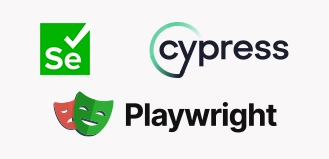QA Automation And Software Testing Tools
Advanced QA automation and software testing tools designed to improve accuracy, speed, and efficiency
Contact usWhat Are Software Testing Tools?
Software testing tools are solutions that help teams check whether an application works the way it should. Instead of relying only on manual checks, these tools make it easier to find bugs, speed up testing, and improve overall quality. With the right QA automation tools, businesses can deliver reliable software faster and with more confidence.
One of the key distinguishing factors is our ability to provide services on a
broad spectrum of
tools available.
Some of the more commonly used tools include:
-
Salesforce Automation Tools

-
UI Automation Tools

-
Mobile Testing Tools

-
Automation Frameworks

-
CI/CD Tools

-
Bug Tracking Tools

-
Performance Testing Tools

-
Test Management Tool

-
Reporting

-
Languages Used For Automation

-
Security Testing Tool

-
API

Why QA testing tools are essential for software quality assurance?
In today’s fast-paced digital world, delivering reliable software is no longer optional; it’s expected. This is where QA testing tools play a vital role. They help teams identify issues early, ensure accuracy, and keep projects on track without delays.
Modern businesses rely on QA automation tools and automated software testing tools to speed up testing, reduce manual effort, and achieve better test coverage. The best software testing tools not only detect bugs but also improve collaboration, streamline workflows, and boost overall product quality.
Whether you’re exploring an automation testing tools list, choosing the right solution ensures that your software is faster, safer, and more user-friendly. With the right quality assurance tools, your team can deliver products that customers trust every time.
Key Benefits of QA and Automation Tools
Using the right QA testing tools and QA automation tools can transform the way your team builds and delivers software. Here are the key benefits:
-
Improved Accuracy
Automation reduces human error and delivers consistent, repeatable results.
-
Faster Release Cycles
Speed up testing to ship features sooner with confidence.
-
Cost Efficiency
Reduce rework and manual effort to lower overall testing costs.
-
Better Test Coverage
Cover more scenarios than manual testing-across browsers, devices, and data.
-
Stronger Collaboration
Shared insights align developers, testers, and managers.
-
Scalability & Flexibility
Scale testing as projects grow and adapt to changing needs.
How to Choose the Right QA Automation & Software Testing Tool?
Selecting the right tool can make all the difference between smooth delivery and endless rework. With so many options available, from the best QA automation tools to the top 10 software testing tools, it’s important to match your choice with your project goals.
Here are a few things to consider:
-
Project Requirements
Identify whether you need QA testing tools for manual checks and faster execution.
-
Ease of Use
The best software quality assurance tools are simple to set up and integrate with your existing workflow.
-
Budget & Licensing
Review costs carefully; some automation testing tools list includes free open-source options while others are premium.
-
Scalability
Ensure the tool can grow with your testing needs as projects expand.
-
Integration Support
Look for quality assurance tools that connect easily with DevOps, CI/CD, and project management platforms.
FAQs
QA automation tools make the testing process faster and more reliable by cutting down on repetitive manual work. They minimize errors, improve test coverage, and are especially helpful for projects that need frequent updates or have complex features.
The best QA automation tools vary depending on your project goals and budget. Popular options from the top software testing tools include Selenium, JUnit, TestComplete, and QTP, each known for making testing faster and more efficient.
Quality assurance tools keep the development process consistent and reliable. They help teams catch bugs early, encourage smoother collaboration, and ensure that the final product is stable, user-friendly, and ready for launch.
Manual testing tools require testers to check software features step by step, which takes more time and effort. In contrast, automated software testing tools use scripts to run tests repeatedly and quickly, saving time while improving accuracy.